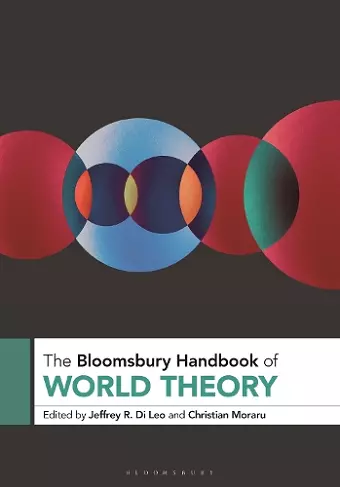The Bloomsbury Handbook of World Theory
Examining the Concept of 'World' in Academic Inquiry
Professor Jeffrey R Di Leo editor Professor Christian Moraru editor
Format:Paperback
Publisher:Bloomsbury Publishing PLC
Published:25th Jan '24
£39.99
Supplier delay - available to order, but may take longer than usual.

This comprehensive handbook explores the implications of 'world' across various academic fields, highlighting its transformative role in contemporary scholarship, as seen in The Bloomsbury Handbook of World Theory.
In recent years, various disciplines have experienced a significant shift, redirecting their focus towards the concepts of 'world,' 'globe,' 'planet,' and 'earth.' The Bloomsbury Handbook of World Theory delves into the implications of these terms and their impact across diverse academic fields. Contributors explore what it means to incorporate 'world' into humanistic or scientific inquiries, raising critical questions about the relationship between 'worlding' and the theoretical frameworks that underpin different areas of study.
With contributions from 38 prominent theorists spanning a wide array of disciplines, including queer studies, religion, and pop culture, this handbook serves as a comprehensive reference work. It investigates how the notion of 'world' influences discourse within and beyond the academic realm in the 21st century. The contributors examine the theoretical models that enable 'world' to operate meaningfully within various knowledge domains, shedding light on the transformative power of 'worlding' in contemporary scholarship.
The Bloomsbury Handbook of World Theory is the first extensive resource to analyze the profound effects of 'worlding' on academic discourse. By addressing the evolving nature of these fields, the handbook contributes to a deeper understanding of how the concept of 'world' reshapes methodologies, vocabularies, and the very essence of inquiry across disciplines.
Undoubtedly, this Bloomsbury Handbook of World Theory is the most unusual English-language handbook I have encountered this year: original, inspiring, thought-provoking, and diversified. Because of its interdisciplinary — and even transdisciplinary — scope, the Bloomsbury Handbook of World Theory is indispensable for research libraries and would serve as an eye-opener for open-minded scholars in an infinity of domains. It reaffirms the pertinence (or the urgency?) of doing theory in a globalized world. Reading this Handbook from one cover to another can be a rewarding experience, no matter in which academic filed you locate yourself. These contributors want to bring the reader beyond. * UCLA Electronic Green Journal *
Written in conscious opposition to the priorities sustained by neoliberal globalism, the essays in The Bloomsbury Handbook of World Theory envision how a 'worlding' of academic fields as well as other discourses and professions can truly democratize and decolonize the domains of work, the arts, and education throughout the planet. These essays propose models rooted in both interdisciplinarity and individuality that can effectively resist the homogenization and top-down models universally dominant since the Fall of the Berlin Wall. * John Pizer, Professor of German, Louisiana State University, USA, and author of The Idea of World Literature: History and Pedagogical Practice *
By now, the world has been approached from almost every angle. As long as one is not satisfied with easy universalism, this goal is already difficult to achieve at a discipline level. Yet, Di Leo, Moraru and their many contributors go far beyond that. They end up interweaving all of the specific readings to help us better understand what is really meant by worlding. The effort is immense; the result is extraordinary. * Bertrand Westphal, Professor of Comparative Literature and Literary Theory, Université de Limoges, France, and author of The Plausible World *
No better proof can be imagined that theory is alive and well than this visionary collection, which takes on the mystery of how thinking has changed, and will have to change further, in response to the challenge of the world scale. It treats what “the world” means not only to an extraordinary range of disciplines, ranging from the humanities to the natural sciences, but also in the professions and, perhaps most important, in zones of concern like sexuality and visual culture that are still seeking their optimum academic organization. The word “inter-disciplinary” is grossly inadequate to describe the intellectual ambition of this volume. Massive as it is, it is still more ambitious than its size indicates. The only thing standing in the way of calling it a landmark is its irresistible freshness. * Bruce Robbins, Old Dominion Foundation Professor in the Humanities, Columbia University, USA, and author of The Beneficiary *
ISBN: 9781501380921
Dimensions: unknown
Weight: unknown
528 pages